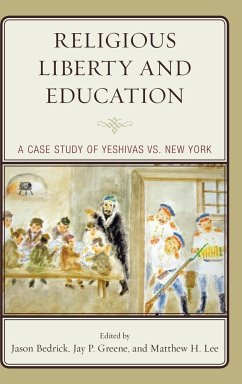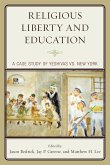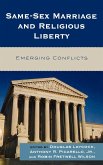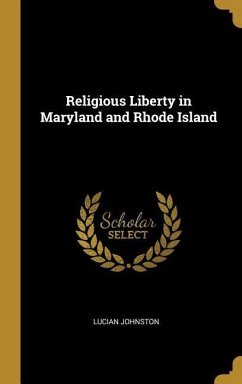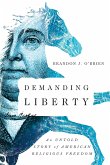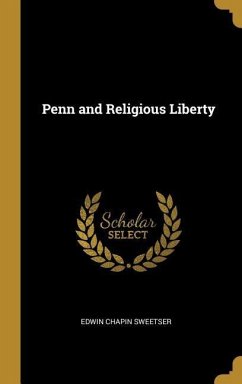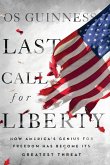Jason Bedrick, Jay P. Greene, Matthew H. Lee
Religious Liberty and Education
A Case Study of Yeshivas vs. New York
Jason Bedrick, Jay P. Greene, Matthew H. Lee
Religious Liberty and Education
A Case Study of Yeshivas vs. New York
- Gebundenes Buch
- Merkliste
- Auf die Merkliste
- Bewerten Bewerten
- Teilen
- Produkt teilen
- Produkterinnerung
- Produkterinnerung
Uses an ongoing legal controversy to explore the controversial subject of religious liberty and education.
Andere Kunden interessierten sich auch für
![Religious Liberty and Education Religious Liberty and Education]() Jason BedrickReligious Liberty and Education46,99 €
Jason BedrickReligious Liberty and Education46,99 €![Same-Sex Marriage and Religious Liberty Same-Sex Marriage and Religious Liberty]() Same-Sex Marriage and Religious Liberty76,99 €
Same-Sex Marriage and Religious Liberty76,99 €![Same-Sex Marriage and Religious Liberty Same-Sex Marriage and Religious Liberty]() Same-Sex Marriage and Religious Liberty172,99 €
Same-Sex Marriage and Religious Liberty172,99 €![Religious Liberty in Maryland and Rhode Island Religious Liberty in Maryland and Rhode Island]() Lucian JohnstonReligious Liberty in Maryland and Rhode Island34,99 €
Lucian JohnstonReligious Liberty in Maryland and Rhode Island34,99 €![Demanding Liberty Demanding Liberty]() Brandon J. O'BrienDemanding Liberty25,99 €
Brandon J. O'BrienDemanding Liberty25,99 €![Penn and Religious Liberty Penn and Religious Liberty]() Edwin Chapin SweetserPenn and Religious Liberty33,99 €
Edwin Chapin SweetserPenn and Religious Liberty33,99 €![Last Call for Liberty Last Call for Liberty]() Os GuinnessLast Call for Liberty29,99 €
Os GuinnessLast Call for Liberty29,99 €-
-
-
Uses an ongoing legal controversy to explore the controversial subject of religious liberty and education.
Hinweis: Dieser Artikel kann nur an eine deutsche Lieferadresse ausgeliefert werden.
Hinweis: Dieser Artikel kann nur an eine deutsche Lieferadresse ausgeliefert werden.
Produktdetails
- Produktdetails
- Verlag: Globe Pequot Publishing Group Inc/Bloomsbury
- Seitenzahl: 184
- Erscheinungstermin: 1. September 2020
- Englisch
- Abmessung: 235mm x 157mm x 15mm
- Gewicht: 426g
- ISBN-13: 9781475854398
- ISBN-10: 1475854390
- Artikelnr.: 58740789
- Herstellerkennzeichnung
- Libri GmbH
- Europaallee 1
- 36244 Bad Hersfeld
- gpsr@libri.de
- Verlag: Globe Pequot Publishing Group Inc/Bloomsbury
- Seitenzahl: 184
- Erscheinungstermin: 1. September 2020
- Englisch
- Abmessung: 235mm x 157mm x 15mm
- Gewicht: 426g
- ISBN-13: 9781475854398
- ISBN-10: 1475854390
- Artikelnr.: 58740789
- Herstellerkennzeichnung
- Libri GmbH
- Europaallee 1
- 36244 Bad Hersfeld
- gpsr@libri.de
Jason M. Bedrick is director of policy for EdChoice and an adjunct scholar with the Cato Institute. He previously served as a legislator in the New Hampshire House of Representatives and was an education policy research fellow at the Josiah Bartlett Center for Public Policy. Jay P. Greene is Distinguished Professor and Chair of the Department of Education Reform at the University of Arkansas. His current areas of research interest include school choice, culturally enriching field trips, and the effect of schools on non-cognitive and civic values. Matthew H. Lee is Distinguished Doctoral Fellow and Senior Research Assistant in the Department of Education Reform at the University of Arkansas. Previously, he was a high school history teacher at a charter school in Massachusetts.
Preface
Introduction
Part One - Philosophical Perspectives on Religious Liberty in Education
1. In Defense of Yeshiva Autonomy by Kevin Vallier
2. Educational Pluralism: Distinctive Schools and Academic Accountability by
Ashley Berner
3. Pork Eating is Not a Reasonable Way of Life: Yeshiva Education vs. Liberal
Educational Theory by Rita Koganzon
Part Two - Religious Liberty and Education Law
4. State Regulation of Curriculum in Private Religious Schools: A
Constitutional Analysis by Aaron Saiger
5. The Yeshiva Case: A Legal Path Forward by Howard Slugh and Devorah Goldman
6. Challenges to Educational Freedom in Europe by Charles L. Glenn
Part Three - Implications for Different Communities
7. "Substantial Equivalency": Implications for the Jewish Community by Avi
Schick
8. The Philosophical Futility of "Substantial Equivalency" in the Interplay of
Religious and Public Education: A Christian School Perspective by Jay
Ferguson
9. Between Tradition and Regulation: What Can Muslim Education Offer the West?
by Jibran Khan
10. An Impossible (and Impermissible) Dream: Equivalency in Homeschools by
Michael P. Donnelly
Part Four - Charting a Path Forward
11. Conclusion: Rabbi Nehorai Gets the Last Word by Ira Stoll
About the Contributors
Introduction
Part One - Philosophical Perspectives on Religious Liberty in Education
1. In Defense of Yeshiva Autonomy by Kevin Vallier
2. Educational Pluralism: Distinctive Schools and Academic Accountability by
Ashley Berner
3. Pork Eating is Not a Reasonable Way of Life: Yeshiva Education vs. Liberal
Educational Theory by Rita Koganzon
Part Two - Religious Liberty and Education Law
4. State Regulation of Curriculum in Private Religious Schools: A
Constitutional Analysis by Aaron Saiger
5. The Yeshiva Case: A Legal Path Forward by Howard Slugh and Devorah Goldman
6. Challenges to Educational Freedom in Europe by Charles L. Glenn
Part Three - Implications for Different Communities
7. "Substantial Equivalency": Implications for the Jewish Community by Avi
Schick
8. The Philosophical Futility of "Substantial Equivalency" in the Interplay of
Religious and Public Education: A Christian School Perspective by Jay
Ferguson
9. Between Tradition and Regulation: What Can Muslim Education Offer the West?
by Jibran Khan
10. An Impossible (and Impermissible) Dream: Equivalency in Homeschools by
Michael P. Donnelly
Part Four - Charting a Path Forward
11. Conclusion: Rabbi Nehorai Gets the Last Word by Ira Stoll
About the Contributors
Preface
Introduction
Part One - Philosophical Perspectives on Religious Liberty in Education
1. In Defense of Yeshiva Autonomy by Kevin Vallier
2. Educational Pluralism: Distinctive Schools and Academic Accountability by
Ashley Berner
3. Pork Eating is Not a Reasonable Way of Life: Yeshiva Education vs. Liberal
Educational Theory by Rita Koganzon
Part Two - Religious Liberty and Education Law
4. State Regulation of Curriculum in Private Religious Schools: A
Constitutional Analysis by Aaron Saiger
5. The Yeshiva Case: A Legal Path Forward by Howard Slugh and Devorah Goldman
6. Challenges to Educational Freedom in Europe by Charles L. Glenn
Part Three - Implications for Different Communities
7. "Substantial Equivalency": Implications for the Jewish Community by Avi
Schick
8. The Philosophical Futility of "Substantial Equivalency" in the Interplay of
Religious and Public Education: A Christian School Perspective by Jay
Ferguson
9. Between Tradition and Regulation: What Can Muslim Education Offer the West?
by Jibran Khan
10. An Impossible (and Impermissible) Dream: Equivalency in Homeschools by
Michael P. Donnelly
Part Four - Charting a Path Forward
11. Conclusion: Rabbi Nehorai Gets the Last Word by Ira Stoll
About the Contributors
Introduction
Part One - Philosophical Perspectives on Religious Liberty in Education
1. In Defense of Yeshiva Autonomy by Kevin Vallier
2. Educational Pluralism: Distinctive Schools and Academic Accountability by
Ashley Berner
3. Pork Eating is Not a Reasonable Way of Life: Yeshiva Education vs. Liberal
Educational Theory by Rita Koganzon
Part Two - Religious Liberty and Education Law
4. State Regulation of Curriculum in Private Religious Schools: A
Constitutional Analysis by Aaron Saiger
5. The Yeshiva Case: A Legal Path Forward by Howard Slugh and Devorah Goldman
6. Challenges to Educational Freedom in Europe by Charles L. Glenn
Part Three - Implications for Different Communities
7. "Substantial Equivalency": Implications for the Jewish Community by Avi
Schick
8. The Philosophical Futility of "Substantial Equivalency" in the Interplay of
Religious and Public Education: A Christian School Perspective by Jay
Ferguson
9. Between Tradition and Regulation: What Can Muslim Education Offer the West?
by Jibran Khan
10. An Impossible (and Impermissible) Dream: Equivalency in Homeschools by
Michael P. Donnelly
Part Four - Charting a Path Forward
11. Conclusion: Rabbi Nehorai Gets the Last Word by Ira Stoll
About the Contributors

